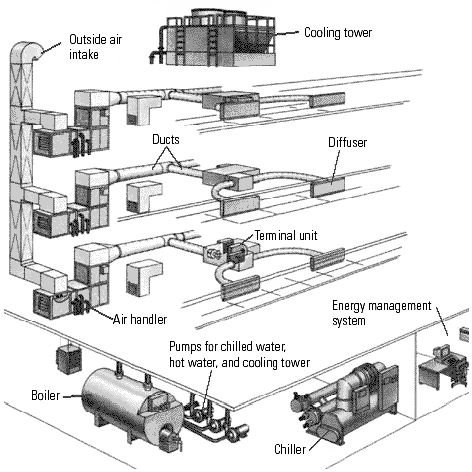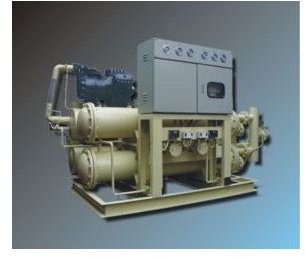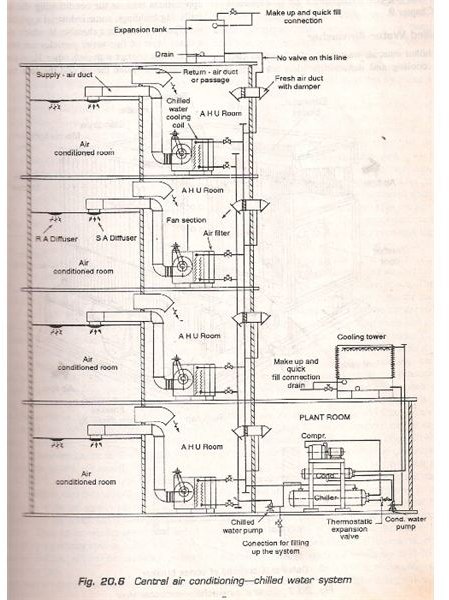Chilled Water Central Air Conditioning Plants
Chilled Water Central Air Conditioning Plants
The chilled water types of central air conditioning plants are installed in the place where whole large buildings, shopping mall, airport, hotel, etc, comprising of several floors are to be air conditioned. While in the direct expansion type of central air conditioning plants, refrigerant is directly used to cool the room air; in the chilled water plants the refrigerant first chills the water, which in turn chills the room air.
In chilled water plants, the ordinary water or brine solution is chilled to very low temperatures of about 6 to 8 degree Celsius by the refrigeration plant. This chilled water is pumped to various floors of the building and its different parts. In each of these parts the air handling units are installed, which comprise of the cooling coil, blower and the ducts. The chilled water flows through the cooling coil. The blower absorbs return air from the air conditioned rooms that are to be cooled via the ducts. This air passes over the cooling coil and gets cooled and is then passed to the air conditioned space.
Chilled Central Air Conditioners


Various Parts of the Chilled Water Air Conditioning Plant
All the important parts of the chilled water air conditioning plant are shown in the above figure and described in detail below:
- Central Air Conditioning Plant Room:
The plant room comprises of all the important components of the chilled water air conditioning plant. These include the compressor, condenser, thermostatic expansion valve and the evaporator or the chiller. The compressor is of open type and can be driven by the motor directly or by the belt via pulley arrangement connected to the motor. It is cooled by the water just like the automotive engine.
The condenser and the evaporator are of shell and tube type. The condenser is cooled by the water, with water flowing along the shell side and refrigerant along the tube side.The thermostatic expansion valve is operated automatically by the solenoid valve.
The evaporator is also called as the chiller, because it chills the water. If the water flows along the shell side and refrigerant on the tube side, it is called as the dry expansion type of chiller. If the water flows along tube side and the refrigerant along the shell side, it is called as the flooded chiller. The water chilled in the chiller is pumped to various parts of the building that are to be air conditioned. It enters the air handling unit, cools the air in cooling coil, absorbs the heat and returns back to the plant room to get chilled again. The amount of water passing into the chiller is controlled by the flow switch.
In the central air conditioning plant room all the components, the compressor, condenser, thermostatic expansion valve, and the chiller are assembled in the structural steel framework making a complete compact refrigeration plant, known as the chiller package. Piping required to connect these parts is also enclosed in this unit making a highly compact central air conditioning plant.
- Air Handling Unit Rooms:
The air handling units are installed in the various parts of the building that are to be air conditioned, in the place called air handling unit rooms. The air handling units comprise of the cooling coil, air filter, the blower and the supply and return air ducts. The chilled water flows through the cooling coil. The blower absorbs the return hot air from the air conditioned space and blows it over the cooling coil thus cooling the air. This cooled air passes over the air filter and is passed by the supply air ducts into the space which is to be air conditioned. The air handling unit and the ducts passing through it are insulated to reduce the loss of the cooling effect.
- Air Conditioned Rooms:
These are the rooms or spaces that are to be air conditioned. These can be residential or hotel rooms, halls, shops, offices, complete theater, various parts of the airport etc. At the top of these rooms the supply and the return air ducts are laid. The supply air ducts supply the cool air to the room via one set of the diffusers, while the return air ducts absorbs the hot return air from the room by another set of the diffusers. The hot return air enters the air handling unit, gets cooled and again enters the room via supply duct to produce air conditioning effect.
- Cooling Tower:
The cooling tower is used to cool the water that absorbs heat from the compressor and the condenser. When water flows through these components some water gets evaporated, to make up this loss some water is also added in the cooling tower. The cooling tower is of evaporative type. Here the water is cooled by the atmospheric air and is re-circulated through the compressor and the condenser.
Image Courtesy and Reference
- Basic Refrigeration and Air-conditioning by P N Ananthanarayanan, Tata McGraw-Hill Publishing Company Limited.
This post is part of the series: Central Air Conditioner Plants. Central Air Conditioning Plants
There are two types of central air conditioning systems: Direct Expansion (DX) type of central air condition plants and Chilled Water type of the central air conditioning plants. In this series of articles both these plants and air handling units have been described.
